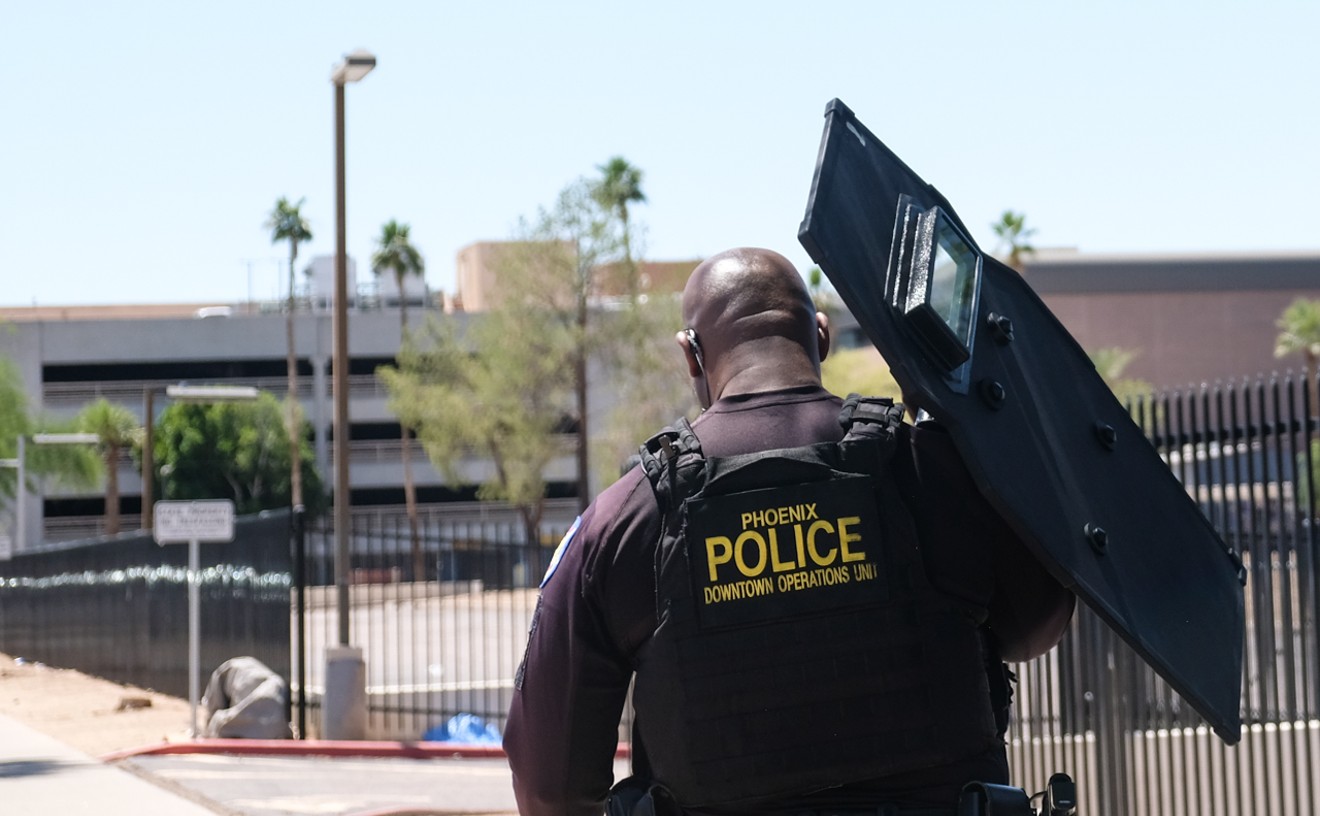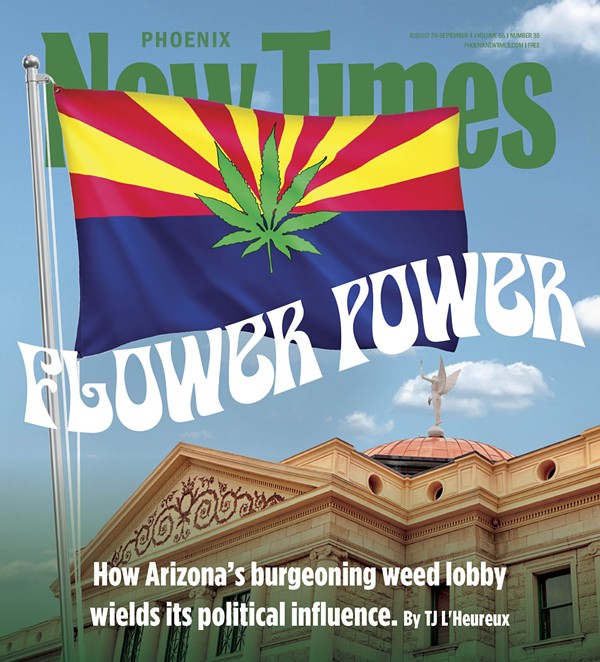Publish an incorrect dispensary address, and you could go to jail.
You heard right: Under a proposed law, any local group or company who publishes an incorrect address for a dispensary would be guilty of a felony, and subject to a mandatory $10,000 for each violation.
That's just one of several new ideas by a trio of prohibitionist Arizona lawmakers who want to tamper with the state's medical-marijuana program and prevent an adult-use measure from ever making the ballot.
"In Arizona, this is the only small business that is being regulated to basically choke it out," said Taylor Swick, a lawyer with AMMA PAC, a registered lobbying group for patients and dispensaries in Arizona.
That being said, Swick acknowledged that conservative lawmakers have been stymied for years in trying to roll back the Arizona Medical Marijuana Act (AMMA), which voters approved in 2010.
The Voter Protection Act, which voters put in place in 1998 after lawmakers gutted an earlier drug-reform measure, prevents legislators from altering a voter-approved bill without a three-fourths majority, and even then the change must further the original bill's purpose.
Still, anti-cannabis lawmakers put pressure on the industry that may inhibit investments and leave patients on edge, even if their tactics are unsuccessful, Swick said.
Whether there will be more attempts to gut the law this session, which runs through May, it's too early to say.
Here's a roundup of the anti-cannabis legislation so far that could change the lives of 160,000 Arizona patients, plus a look at the Hail Mary longshots by Democrats to bring actual improvements for patients and the medical-marijuana industry:
SB 1060 "Jail the Publishers"
Introduced by: David Farnsworth, R-Mesa
Under Farnsworth's bill, a "listing or menu service" with two or more employees that wants to publish information about a dispensary or its product lines would have to first verify the business has an operating certificate on file with the state.
Never mind that the state, or in this case the Arizona Department of Health Services, can't legally confirm the information that a dispensary might give to a publisher. The 2010 medical-marijuana law contains privacy provisions that prevent the DHS from giving out even the name of a dispensary to anyone but valid medical-marijuana cardholders or dispensary agents.
The bill bans the publication of a dispensary address "that is different than the address" on the state certificate. Violators would be guilty of a felony and fined $10,000 for each violation.
Farnsworth's bill says nothing about any exemption for typos.
Farnsworth didn't return a message on Monday.
Attorney Dan Barr of the First Amendment Coalition said the reason for the bill is unclear, since it would be in the dispensary's best interest to have the correct address printed.
"You're going to throw someone in prison for this?" Barr said.
"I am disgusted at Senator Farnsworth's attempt to control the press in Arizona," Dan Kingston of AzMarijuana.com said when contacted for a comment. The bill's passage "would greatly hinder Arizonans access to information about the Arizona medical marijuana industry, such as dispensary locations and products."
Phoenix New Times also has dispensary listings, and could be affected.
HCR 2008 "Federal Deification Act"
Introduced by: Vince Leach, R-Saddlebrooke
House Concurrent Resolutions are meant to make a point. Leach's HCR 2008 aims to begin discussions at the Legislature on a proposed amendment to the state constitution that would cede Arizona's initiative system to the feds, vis-a-vi the state Attorney General's Office.
At anytime before the Secretary of State's Office certifies an initiative for the ballot, the state Attorney General must review the initiative and decide if it conflicts with, or is pre-empted by, federal law. If he or she decides federal law somehow trumps the proposed ballot measure, that's it — the ballot measure's gone.
Leach can't envision a time when a Democrat-controlled Congress and state AG's office are taking his rights away. But such an amendment could solve in the short term what Republicans see as the problem of voters passing an adult-use marijuana-legalization measure like the ones in states that surround Arizona.
HB 2067 "Jail the Doctors"
Introduced by: Vince Leach
If a doctor cheats and gives someone a medical-marijuana card who isn't really eligible, the doctor could have his or her license revoked by a medical board. Leach wants these naughty doctors also to be prosecuted for a felony.
HB 2068 "Pain for Parolees"
Introduced by: Vince Leach
New Times covered this one in a recent article. The state Supreme Court ruled in 2015 that medicinal marijuana can't be taken away from people just because they happen to be on probation or parole. Leach's bill would put that decision back in the hands of prosecutors, who aren't likely to help parolees and probationers obtain cannabis to help what ails them.
HB 2064 "Gummy Bears Cause Scares"
Introduced by Vince Leach
This bill would not allow dispensaries to "acquire, possess, manufacture or sell a marijuana product that is packaged or labeled in a manner that is attractive to minors."
Attractiveness to minors is defined as anything with a cartoon, a "design, brand or name" that resembles a non-cannabis product that might be marketed to minors, any symbol or celebrity image commonly used to market to minors, an image of minors, or "words that refer to products that are commonly associated with minors or marketed to minors."
The bill doesn't spell out penalties for violators, but dispensaries deemed out of compliance with the medical-marijuana program, in general, could lose their license.
Last year, Colorado banned cannabis products that look like candy. While it's true that no one wants to see kids rushed to the hospital because of an accidental cannabis ingestion, it's also true that Leach's intent seems to be more harassment of patients and the industry than trying to improve the 2010 law.
HB 2066 "Raid the Fund"
Introduced by: Vince Leach
Arizona medical-marijuana patients pay $150 to the state each year for their cards, which allow them to buy up to 2.5 ounces of products every two weeks at state dispensaries. Registered caregivers, dispensary agents, and dispensaries, also pay fees ranging up to $5,000 for an initial dispensary registration. The money has been collected in a fund but used rarely since it began amassing in 2011. It now totals more than $40 million.
Leach wants the director of the state DHS to be able to use the money for "enforcement" of the medical-marijuana law and "education, awareness and prevention messaging."
SB 1061 "Raid the Fund, and More"
Introduced by: David Farnsworth
Senator Farnsworth wants to extract $5 million from the medical-marijuana fund and spent it on general drug-trafficking enforcement this year and next.
His bill also directs the DHS to reformulate its rules to "address" dispensaries that move from their original, state-mandated regional locations and "labeling and testing of edible medical marijuana products." He doesn't say how these things should be addressed, however. DHS would be free to address and modify registration and renewal fees for dispensaries and dispensary agents, too.
HB 2398 "The Contact High Bill"
Introduced by: Bob Thorpe, R-Flagstaff
Thorpe's bill takes money from the state's tobacco fund and puts it toward substance-abuse education, with an emphasis on marijuana.
He'd require teachers or groups like the well-connected notMYkid to give public-school students from fifth to 12th grade two hours of anti-drug and alcohol education. Interestingly, the bill requires the teaching of the "negative effects" of "using tobacco, marijuana and illegal drugs," but only of "abusing alcohol." Did the alcohol lobby reach Thorpe for that verbiage tweak?
The bill would make the DHS come up with programs that "emphasize the possible dangers of secondhand tobacco and marijuana smoke, emergency health issues for persons or animals caused by ingesting food containing marijuana and potential negative impacts to cognitive development caused by the use of tobacco and marijuana."
What are the dangers of secondhand marijuana smoke? The National Institute on Drug Abuse states on its website that it may be possible to get a "contact high," but that "very little research on this question has been conducted."
Thorpe rounds out his bill with an order to DHS to make dispensaries put signs up, and for doctors to warn patients about these "possible dangers" of marijuana.
Meanwhile, Democratic lawmakers have put several of their own bills on tap this year to deal with cannabis-related issues:
HB 2144 "Our Vote, Our Law"
Introduced by: Mark Cardenas, D-Phoenix
Sort of a local version of the Rohrabacher-Blumenauer Amendment, Cardenas' bill would prohibit state and local police from assisting federal authorities in clamping down on the state's medical-marijuana program or its patients.
HB 2014 "Almost Legalization"
Introduced by: Mark Cardenas
You can always count on Cardenas to introduce a bill to either legalize or decriminalize marijuana. Just don't count on the bills to pass.
HB 2100 "Let It Be"
Introduced by: Several Democratic lawmakers
Arizona medical-marijuana patients have to renew their cards every year. This bill would extend that to every five years.
If they wanted to be really generous, though, they could make the expiration for a medical-marijuana card the same as for a driver's license: When the person turns 65.
HB 2199 "Be Nice to Patients"
Introduced by: Several Democratic lawmakers
Lowers the yearly card fee for patients from $150 to $50.
HB 2147 "Be Even Nicer to Patients"
Introduced by: Mark Cardenas
Not to be outdone by his colleagues, the cannabis-friendly Cardenas would lower the yearly patient card fee to $15.
SB 1098 "Hemp, Hemp, Hooray"
Introduced by a bipartisan group of legislators
This bill would legalize an industrial hemp industry in Arizona, guided by federal law. As New Times reported in November, hemp is a major source of over-the-counter cannabidiol (CBD) sold online and by local smoke shops. It's also used to make a large range of products.
Demetri Downing, executive director of the Marijuana Trade Industry Association, said he'd like to see Arizona's conservative lawmakers open up more of their Libertarian tendencies and help the industry, rather than continue to put up obstacles. Downing said he worked with Cardenas on the anti-federal-assistance bill and wished he could do the same with Republicans.
"It's ironic that you have a Democrat protecting states' rights and the will of Arizona voters, and you have Republicans doing the opposite," Downing said.

Audio By Carbonatix
[
{
"name": "Air - MediumRectangle - Inline Content - Mobile Display Size",
"component": "18478561",
"insertPoint": "2",
"requiredCountToDisplay": "2",
"watchElement": ".fdn-content-body",
"astAdList": [
{
"adType": "rectangle",
"displayTargets": "mobile"
}
]
},{
"name": "Editor Picks",
"component": "16759093",
"insertPoint": "4",
"requiredCountToDisplay": "1",
"watchElement": ".fdn-content-body",
"astAdList": [
{
"adType": "rectangle",
"displayTargets": "desktop|tablet"
},{
"adType": "rectangle",
"displayTargets": "desktop|tablet|mobile"
}
]
},{
"name": "Inline Links",
"component": "17980324",
"insertPoint": "8th",
"startingPoint": 8,
"requiredCountToDisplay": "7",
"maxInsertions": 25
},{
"name": "Air - MediumRectangle - Combo - Inline Content",
"component": "16759092",
"insertPoint": "8th",
"startingPoint": 8,
"requiredCountToDisplay": "7",
"maxInsertions": 25,
"watchElement": ".fdn-content-body",
"astAdList": [
{
"adType": "rectangle",
"displayTargets": "desktop|tablet"
},{
"adType": "rectangle",
"displayTargets": "desktop|tablet|mobile"
}
]
},{
"name": "Inline Links",
"component": "17980324",
"insertPoint": "8th",
"startingPoint": 12,
"requiredCountToDisplay": "11",
"maxInsertions": 24
},{
"name": "Air - Leaderboard Tower - Combo - Inline Content",
"component": "16759094",
"insertPoint": "8th",
"startingPoint": 12,
"requiredCountToDisplay": "11",
"maxInsertions": 24,
"watchElement": ".fdn-content-body",
"astAdList": [
{
"adType": "leaderboardInlineContent",
"displayTargets": "desktop|tablet"
},{
"adType": "tower",
"displayTargets": "mobile"
}
]
}
]
















